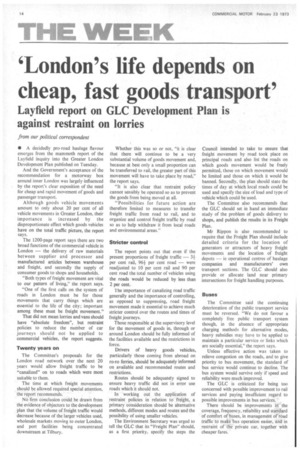'London's life depends on cheap, fast goods transport'
Page 16

If you've noticed an error in this article please click here to report it so we can fix it.
Layfield report on GLC Development Plan is against restraint on lorries
from our political correspondent
• A decidedly pro-road haulage flavour emerges from the mammoth report of the Layfield inquiry into the Greater London Development Plan published on Tuesday.
And the Government's acceptance of the recommendation for a motorway box around inner London was largely influenced by the report's clear exposition of the need for cheap and rapid movement of goods and passenger transport.
Although goods vehicle movements amount to only about 20 per cent of all vehicle movements in Greater London, their importance is increased by the disproportionate effect which goods vehicles have on the total traffic picture, the report says.
The 1200-page report says there are two broad functions of the commercial vehicle in London — the delivery of raw materials between supplier and processor and manufactured articles between warehouse and freight, and secondly the supply of consumer goods to shops and households.
"Both types of freight movement are vital to our pattern of living," the report says.
"One of the first calls on the system of roads in London must be for those movements that carry things which are essential to the life of the city; important among these must be freight movement."
That did not mean lorries and vans should have "absolute freedom", but restraint policies to reduce the number of car journeys should not be applied to commercial vehicles, the report suggests.
Twenty years on The Committee's proposals for the London road network over the next 20 years would allow freight traffic to be "canalized" on to roads which were most suitable to them.
The time at which freight movements should be allowed required special attention, the report recommends.
No firm conclusion could be drawn from the evidence of objectors to the development plan that the volume of freight traffic would decrease because of the larger vehicles used, wholesale markets moving to outer London, and port facilities being concentrated downstream at Tilbury. Whether this was so or not, "it is clear that there will continue to be a very substantial volume of goods movement and, because at best only a small proportion can be transferred to rail, the greater part of this movement will have to take place by road," the report says.
"It is also clear that restraint policy cannot sensibly be operated.so as to prevent the goods from being moved at all.
"Possibilities for future action are therefore limited to measures to transfer freight traffic from road to rail, and to organize and control freight traffic by road so as to help withdraw it from local roads and environmental areas."
Stricter control The report points out that even if the present proportions of freight traffic — 3+ per cent rail, 96+ per cent road — were readjusted to 10 per cent rail and 90 per cent road the total number of vehicles using the roads would be reduced by less than 2 per cent.
The importance of canalizing road traffic generally and the importance of controlling, as opposed to suppressing, road freight movement made it essential to achieve much stricter control over the routes and times of freight journeys.
Those responsible at the supervisory level for the movement of goods in, through or around London should be fully informed of the facilities available and the restrictions in force.
Drivers of heavy goods vehicles, particularly those coming from abroad on ro-ro ferries, should be adequately informed on available and recommended routes and restrictions.
Routes should be adequately signed to ensure heavy traffic did not in error use roads which it should not.
In working out the application of restraint policies in relation to freight, a primary consideration should be alternative methods, different modes and routes and the possibility of using smaller vehicles.
The Environment Secretary was urged to tell the GLC that its "Freight Plan" should, as a first priority, specify the steps the Council intended to take to ensure that freight movement by road took place on principal roads and also list the roads on which goods movement would be freely permitted, those on which movement would be limited and those on which it would be banned. Secondly, the plan should state the times of day at which local roads could be used and specify the size of load and type of vehicle which could be used.
The Committee also recommends that the GLC should set in hand an immediate study of the problem of goods delivery to shops, and publish the results in its Freight Plan.
Mr Rippon is also recommended to require that the Freight Plan should include detailed criteria for the location of generators or attractors of heavy freight movements and the location of freight depots — ie operational centres of haulage companies and manufacturers' own transport sections. The GLC should also provide or allocate land near primary intersections for freight handling purposes.
Buses The Committee said the continuing deterioration of the public transport service must be reversed. "We do not favour a completely free public transport system though, in the absence of appropriate charging methods for alternative modes, heavy subsidies may have to be applied to maintain a particular service or links which are socially essential," the report says.
Unless effective action was taken to relieve congestion on the roads, and to give priority to bus movement, the standard of bus service would continue to decline. The bus system would survive only if speed and reliability were much improved.
The GLC is criticized for being too concerned with possible improvement to rail services and paying insufficient regard to possible improvements in bus services.
There should be improvements in the .coverage, frequency, reliability and standard of comfort of buses, in management of road traffic to make bus operation easier, and in restraint of the private car, together with cheaper fares.
































































































